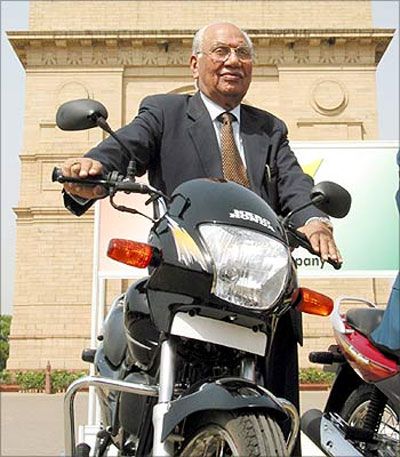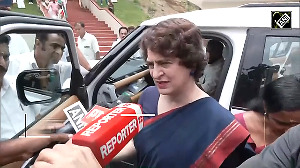Brijmohan Lall Munjal, 92, who recently became chairman emeritus of Hero MotoCorp, single-handedly rewrote the rules of the motorcycle business, says AJay Modi.
 Brijmohan Lall Munjal was not keen to manufacture motorcycles when he was inking an agreement with Honda in the early 1980s. India was primarily a scooter market in those days and Honda had already signed up with the Firodias of Kinetic to make scooters. Still, he went ahead with the deal in 1984. In the midst of such niggling doubts was born Hero Honda.
Brijmohan Lall Munjal was not keen to manufacture motorcycles when he was inking an agreement with Honda in the early 1980s. India was primarily a scooter market in those days and Honda had already signed up with the Firodias of Kinetic to make scooters. Still, he went ahead with the deal in 1984. In the midst of such niggling doubts was born Hero Honda.
The gamble paid off - and how. Scooters steadily went out of fashion, and Munjal’s company, now called Hero MotoCorp, went on to become the country’s largest motorcycle maker.
A fair share of the credit for this drastic change in consumer preference must go to Munjal, who earlier this month decided to step down from the position of chairman at Hero MotoCorp to become chairman emeritus. He positioned his motorcycles as more fuel efficient than scooters, which struck a chord with cost-conscious Indian buyers. The “Fill it, shut it, forget it” campaign remains one of the most effective ones in the country’s corporate history.
Others too launched fuel-efficient motorcycles, but Munjal had by then created a huge gap between his company and others through his bold initiatives in dealership management.
In the 1980s, there was no concept of organised dealership networks. Companies produced and sold through traders. Munjal set out to change the rules of the business by bringing norms that were ahead of his time. In due course, the company’s dealership network became an entry barrier.
Munjal got personally involved in appointing all dealers from day one. His relationship with them is such that they enjoy the comfort and freedom to reach out directly to Munjal on any issue rather than approaching the concerned department. A company executive says Munjal knows almost every dealer by his first name. He started the trend of taking them on overseas junkets and would spare no expenses in hospitality.
A maker of household electrical goods remembers how after an unscheduled meeting at Shimla, Munjal met him in Delhi to understand how his dealers could also become dealers of electrical goods.
“Thanks to the relationships that we have nurtured so passionately in the Hero family, the younger generations of some of our bicycle dealers have become dealers of Hero MotoCorp. These relationships have survived through generations —through bad times and good times,” the company’s website quotes Munjal as saying.
Competitor Rahul Bajaj, who has known Munjal for three decades, is not shy to acknowledge Munjal’s success. Bajaj, chairman of Bajaj Auto, says he has always considered Munjal his ‘Guru’. Bajaj says he is highly impressed by Munjal’s “very charming and affectionate nature”. “I believe, one of the major reasons for the success of Hero MotoCorp, especially during the last decade, has been Munjal’s inter-personal relationships with his employees, his vendors and his distributors. I believe he treats them as members of his family,” says Bajaj.
A motorcycle was not the first product Munjal produced to make mobility affordable and easy. Born in 1923 in Punjab’s Kamalia, now in Pakistan, Munjal and his brothers shifted base to Amritsar in 1943 and then to Ludhiana where they gave shape to their bicycle component business. The business graduated to cycle manufacturing and in 1975 became the largest cycle producer, leaving competitors like Atlas behind.
The big change
In its push for industrialisation, the Indian government was giving licences to produce mopeds. Munjal had seen mopeds on trips overseas and was quick to spot an opportunity. But Hero Cycles needed a partner to venture into moped production. Efforts to rope in French two-wheeler major Peugeot did not materialise and Hero started producing its own mopeds under a company called Majestic Auto. By 1983, Majestic had captured one-third of the domestic moped market.
Then Honda got into the picture.
In September 2006, Bajaj Auto came within inches of dislodging the Munjal flagship from the top of the motorcycle market. There was panic in the company. If it was overtaken by Bajaj Auto, its brand equity would suffer serious erosion.
The Munjals, to their credit, decided the time had come to focus on market share instead of profits; or else, there would one day be no profits to protect. And that is when the company developed marketing savvy. It started thinking and behaving like an FMCG company. That saved the day for the Munjals.
In 2011, Hero parted ways with Honda to create Hero MotoCorp. The Munjals had the option to use the Hero Honda brand till June 2014, but they decided to replace it with Hero as early as possible. As it involved renewal, the project was codenamed Yajna. Wolff Ollins, an Omnicom company, was engaged to give the company a new identity.
It came out with the name Hero MotoCorp. Law & Kenneth was hired to craft the new communication strategy. It came up with the line, Hum main hai Hero (There is a Hero in us). Lyricist Irshad Kamil expanded it into an anthem, AR Rahman set it to music and Anurag Kashyap made it into a film. To unveil the new identity to his dealers, Munjal chose London because it is a blend of tradition and modernity.
M Damodaran, the former chairman of the Securities & Exchange Board of India who has been associated with the Hero MotoCorp board since 2008 as a non-executive and independent director, says Munjal is clearly the father of the Indian two-wheeler industry.
“A visionary leader, he (Munjal) managed relationships at all levels, including dealers, to make the company what it is today. Getting the best out of people is his strength. The position he held and his achievements sat lightly on his shoulders.”
Munjal, 92, has passed the baton to his son, Pawan Munjal, who is now the chairman, chief executive officer and managing director of the company. Pawan and his team need to guard and grow the market share in motorcycles and fight aggressively to capture market in scooter, a growth segment dominated by the company’s former partner, Honda.
Photograph: Danish Ismail/Reuters












 © 2025
© 2025